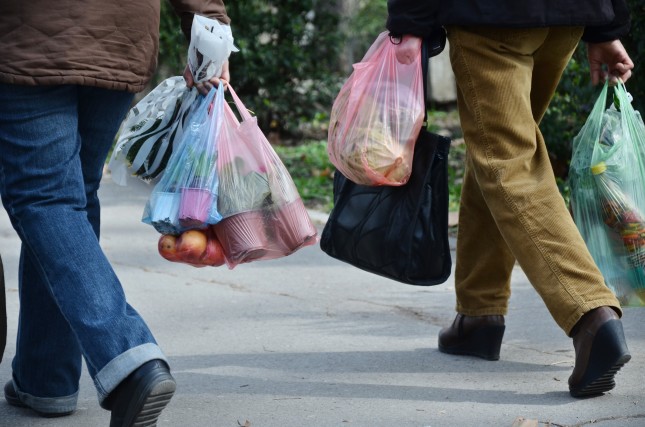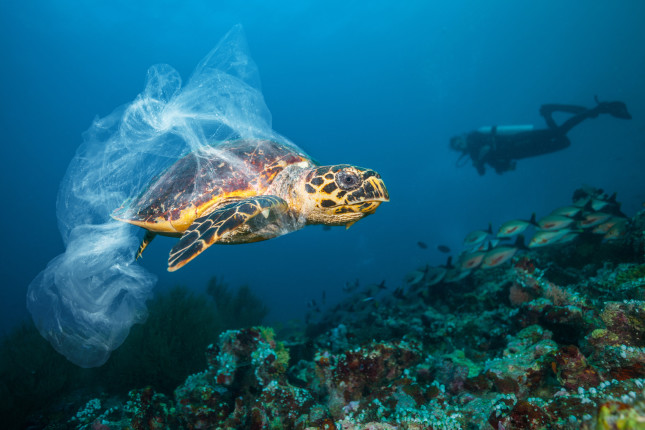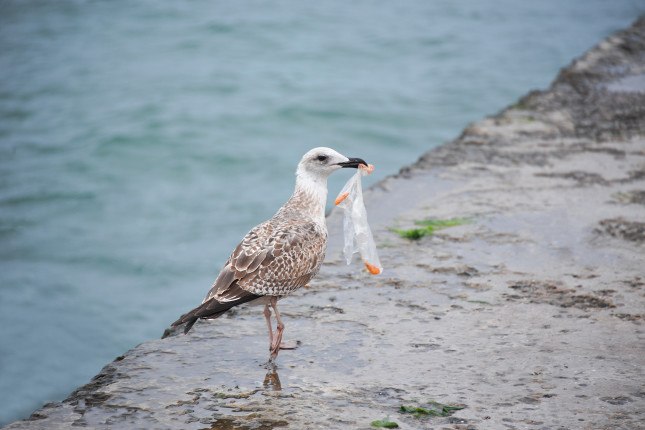-
Would You Like a Bag (Ban) with That?
May 13, 2021 By Eli Patton
China, which threw global plastic recycling markets into disarray in 2018 with its Green Sword policy banning plastic waste imports, has been ratcheting up domestic regulations to reign in single-use plastics. In January of 2020, China’s National Reform Development Commission announced a stringent policy for a nationwide plastic bag ban by 2022. China is not alone. Bans and taxes on plastic bags are spreading around the globe and they might soon come to your neighborhood, if they haven’t already.
A few decades ago they did not exist at all, but now plastic bags sit at the register of seemingly every store in the world. Their proliferation is easy to understand, plastic bags are very resilient and inexpensive for consumers. These qualities also make them an environmental menace. In the Ocean Conservancy’s annual International Coastal Cleanups plastic bags have consistently ranked in the top ten of most commonly found types of plastic pollution. Per capita consumption of plastic bags is growing around the world. Despite years of concerted efforts from governments to stem the tide of plastic bags and other single-use plastics, it is predicted more plastic than fish will be in the oceans by 2050.
Extensively Regulated but Still Floating Around
In 2020, with support from the Pew Charitable Trusts, a Duke University research team found that plastic bags have been a major target of regulators around the world for nearly two decades. They note, however, that regulators have overwhelmingly focused on consumer demand, not the production of plastic bags. Currently, bans and fees are the main policy tool to reign in plastic bags. Worldwide three times more plastic bag bans are in place than bag fees. The Duke report found that lower-income nations have passed the most plastic bag bans.
Yet, bans and fees on plastic bags do not always work well. In 2002, the government of South Africa instituted a fee of 3 U.S. dollars per bag and consumption quickly dropped by 90 percent. However, consumers were unhappy and corporations lobbied the government leading to a drastic reduction in the fee, which renewed consumption of plastic bags. This “rebound effect” was also seen in Ireland, in 2002, where the government was unable to find a good middle ground to placate consumers angry at a high bag fee. In the end the fee was set so low it did not limit plastic bag consumption.
Fees and Bans Around the World
China’s new nationwide plastic bag ban aims to remedy the enforcement problems that plagued the 2007 ban. This new ban may have more muscle as the government has prioritized waste as another front in its war on pollution. Moreover, consumers and environmental NGOs are also taking grassroots action on plastic pollution. SUPChina reported recently that bigger stores and businesses in China are complying to the bag ban, but smaller shops and food delivery businesses lag in compliance.
Indonesia and other Southeast Asian countries are second only to China in ocean plastic leakage and plastic bags are a major culprit. Grassroots groups have pushed Indonesian cities to ban plastic bags and some neighboring countries have instituted national bag bans. Thailand in 2020 outright banned thin single-use plastic bags at major grocery chains and within weeks the number of bags consumed dropped by the billions. Last year Malaysia added a fee to all bags with the goal of a full ban by 2022, which according to Jazlyn Lee from WWF, will help to stem the flow of plastics from the rapidly growing food delivery sector. Vietnam has a growing consumer- and business-led campaign to voluntarily reduce bags and other single-use plastics.
In the Philippines, where plastic bags, sachets, and cups are clogging rivers and beaches, President Duterte is considering a national plastic bag ban. For years, districts and municipalities in Southeast Asia have implemented various bans/fees on plastic bags and other single-use plastics. According to GAIA’s Miko Aliño, these are beginning to trickle up to influence national policymakers. Specifically, the Philippine government’s Climate Change Commission has endorsed the call for a national ban. Despite this new “champion,” Miko also reminded us in an interview that the pandemic has pushed some municipalities to relax regulations on plastic bags.
The European Union started mandating limits on plastic bags in a 2015 directive and passed a full ban on bags and other single-use plastics in 2019. Instead of a ban, on July 1, 2020 the Japanese government required all convenience stores to charge a minimum fee of 3 yen (nearly 0.03 USD) for a plastic bag. The young instagram crowd in Japan has sparked a growing fad of using recycled and reusable grocery bags, setting new cultural norms toward reducing and reusing single-use plastics.
The United States has the highest per capita consumption of single-use plastics in the world and, like most nations, only manages to recycle about 10 percent. In terms of plastic bags, U.S. consumers use some 90 billion each year and policy to regulate them appears to be split between the two coasts, with the East Coast preferring fees and the West Coast bans. After years of cities and states adopting bans or fees for plastic bags, there is now movement at the federal level. The 2021 Break Free from Plastics draft bill would ban lightweight plastic bags nationwide by 2023 and institute a ten cent deposit that can be refunded for thicker plastic bags, a mix of both types of policies.
From Pollution to Solution
The Ocean Conservancy ranks bag fees as easier to implement than bans, as the latter involve more difficult behavioral changes. Additionally, bag fees could fund plastic cleanup. For example, five years after Washington, DC imposed a five cent plastic bag fee, the city generated roughly $10 million earmarked for the Anacostia River Clean Up and Protection Fund and a public education campaign. Plastic bag litter dropped 60 percent. Masaya Maeda, a water scientist with the Anacostia Watershed Society shared in an interview that DC’s successful bag fee system also led two Maryland counties in the watershed to institute fees and bans on bags and eventually polystyrene containers.
Co-founder of the Indonesia Plastic Bag Diet, Tiza Mafira who joined a recent China Environment Forum panel, told us that banning plastic bags is the “low hanging fruit” for closing the loop on plastic waste. In fact, bans on one type of single-use plastic have also resulted in bans on other forms of single-use plastics such as straws and utensils—further reducing leakage of single use plastics. Yet, despite this, no international policy currently exists to promote bans or other actions to reign in single-use plastics. At the launch event for the Duke report, Professor John Virdin said that over the last decade, governments have seen that banning plastic bags has been, “far and away the best tool they have used to combat this problem.”
Eli Patton is a researcher at Wilson Center’s China Environment Forum. His research focuses on the environmental and security aspects of China’s FDI. Eli earned an MA in Asian Studies from George Washington University and previously worked as a journalist and translator in Taipei city.
Sources: BBC, Ocean Conservancy, CIEL, Washington Post, Pew Charitable Trusts, Duke University Nicholas Institute, China Development Brief, NewSecurityBeat, SupChina, Scientific American, Reuters, Bangkok Post, The Star, VN Express, Rappler, The News Lens International, Government of the city of Quezon Philippines, European Commission, MPR News, Japan Times, Nikkei, Science Magazine, US EPA, Rebecca L. Taylor & Sofia B. Villas‐Boas, United States Senate RYA21300 8Y9, Duke Plastic Policy Inventory,
Lead image credit: People shopping with plastic bags, courtesy of Emilija Miljkovic/Shutterstock.com.
 A Publication of the Stimson Center.
A Publication of the Stimson Center.









